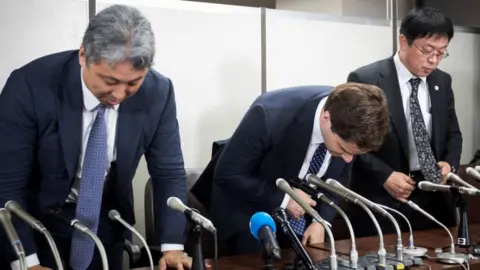Former MtGox Bitcoin exchange boss pleads not guilty
 Getty Images
Getty ImagesThe former head of MtGox, once the world's biggest Bitcoin exchange, has pleaded not guilty in a Tokyo court to charges of embezzlement and data manipulation.
Mark Karpeles was chief executive of MtGox when it collapsed in 2014, following the loss of 850,000 bitcoins, then worth nearly $0.4bn (£0.3bn).
In its bankruptcy filing, MtGox blamed the loss on hackers.
It later said it had found 200,000 bitcoins in old digital wallets.
The prosecution claims that Mr Karpeles transferred 341 million yen ($3 million) from a MtGox account into an account registered in his own name during the last quarter of 2013.
Mr Karpeles' lawyers deny that this was embezzlement.
"I swear to God that I am innocent," he is reported to have told the court.
Today, one bitcoin is worth £1,800, or $2,300, but the digital currency is notoriously volatile.

How Bitcoin works
To process bitcoin transactions, a procedure called "mining" must take place, which involves a computer solving a difficult mathematical problem with a 64-digit solution.
For each problem solved, one block of bitcoins is processed. In addition, the miner is rewarded with new bitcoins.
 Eyewire
EyewireThis provides an incentive for people to provide computer processing power to solve the problems.
To compensate for the growing power of computer chips, the difficulty of the puzzles is adjusted to ensure a steady stream of new bitcoins are produced each day.
There are currently about 15 million bitcoins in existence.
To receive a bitcoin, a user must have a Bitcoin address - a string of 27-34 letters and numbers - which acts as a kind of virtual post-box to and from which the bitcoins are sent.
Since there is no register of these addresses, people can use them to protect their anonymity when making a transaction.
These addresses are in turn stored in Bitcoin wallets, which are used to manage savings.
They operate like privately run bank accounts - with the proviso that if the data is lost, so are the bitcoins owned.

